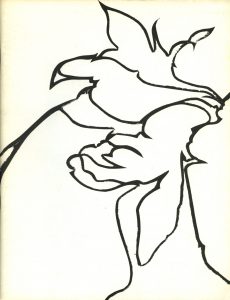for as far as eyes will reach
in every ground direction
there are fresh impressions of truck tires
like tiny roads in some vast stubby desert
they run up
and down
and around rolling hills
barn swallows pluck invisible insects from the air
with batlike agility
the swiftness in their turns
is that of the hitting cobra
it’s day’s end
and these fields are bundleless
as they are now cropless
the gang is being loaded on the back of a cattle truck
being hauled in for the night
two gun-guards take body count from the ground
one (afterwards) pointing to a hump along the horizon
“downhill they load from there
…tomorrow” he tells the other
George Mosby, Jr.’s work appeared in phoebe multiple times in the 70s, 80s, and 90s. Unfortunately, little biographical information on George is found in these issues. From our 1979, 8.2 issue, we see that in addition to phoebe his work appeared in Images, Hanging Loose, The Unicorn, Northwoods Journal, and Vega. In 1978, he won 3rd place in the Wayside Quarterly Poetry Award.
In 1990, phoebe reached out to Mosby’s wife, Judith Ann Mosby. Her response to this request was published in our 20.1&2 issue from 1990. Among other details, she wrote that Mosby was born in 1950. At the age of three, his father, a Korean War veteran, was found hanged in an apple tree in their yard. It is not known whether it was a murder or suicide.
Mosby grew up in poverty, and spent time in the James River Correctional Center where he married Judith Ann in 1982. The following year, upon his parole, they had a daughter.
She closes the letter with this:
“George rests in the backyard of his grandparents, beside his grandmother’s grave. He died of what the medical examiner called an accidental overdose of diphenhydramine, a cough syrup. He was alone at the time of his death and his family is left with doubts as to whether it was an accident, a suicide or a murder.”
Earlier in the letter Judith Ann wrote that, “The poems will have to speak for themselves. I believe there is an underlying concern in George’s work to return to a more peaceful time than the one that surrounded him as an adult.”
